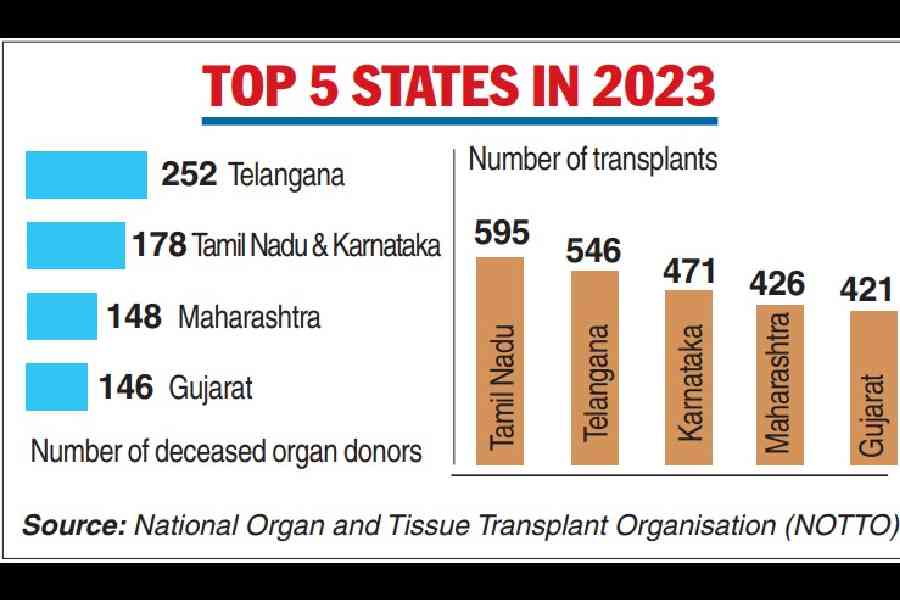Non-transplant organ retrieval centres will be set up in all 24 state government-run medical colleges of Bengal, an official of the health department has said.
These centres will have the facilities to harvest the organs of a brain-dead person, but not conduct transplant surgeries.
Only three medical college hospitals in the state, SSKM Hospital, Medical College Kolkata and NRS Medical College and Hospital, have so far performed organ transplant surgeries.
Harvesting organs of a brain-dead persons are yet to start in the other 21 teaching
hospitals.
Setting up the infrastructure for organ retrieval in all medical colleges will increase the possibility of getting cadaveric organs more frequently and help those in the queue for organ transplant.
A large number of patients in India, including Bengal, die while waiting for an organ transplant, said doctors. There is a big mismatch between the demand and supply of organs.
Senior doctors and hospital administrators recently said that Bengal has seen nearly zero growth in organ donations between 2018 and now.
Cadaveric organ donations had picked up pace in Bengal in 2018. But the number of donations per year has shown a marginal rise between then and now, Manimoy Bandyopadhyay, director of the regional organ and tissue transplant organisation (ROTTO) had said last Friday.
There were 13 organ donors in 2018 and 14 in 2024.
“We will set up non-transplant organ retrieval centres (NTORC) in all 24 state-run medical colleges in Bengal,” said the official of the state health department.
The expansion is part of a larger plan to increase cadaveric organ donations in the state.
Another official said if organ harvesting facilities were not set up in more hospitals, the medical fraternity would lose out on many families who might agree to donate the organs of someone who was declared brain dead at the hospital. But the same hospitals may not have qualified surgeons or necessary infrastructure to conduct the transplant surgery and to provide post-transplant care.
All medical college hospitals report many deaths from accidents and trauma injuries, and proper counselling of the families of the deceased persons may result in some of them agreeing to donate the organs, said officials.
“A well-equipped intensive care unit (ICU) and ventilators will be required to harvest the organs from the brain-dead person,” said a doctor who worked in Bengal’s public healthcare sector for several decades.
The doctor said in the absence of organ retrieval centres, the brain-dead person would have to be transported many kilometres to the hospital where the recipient will be present.
“The movement may lead to cardiac arrest and render the organs unusable.”
At a conference on organ donation and transplant held in the city on Friday, senior doctors and health department officials flagged the stagnation of organ donation in Bengal.
A senior official of a state government-run medical college hospital said the picture in Bengal was way behind that in south India and some western Indian states.
An increase in the number of deceased donations can help curb organ trafficking because it will slash the requirement for live donations. It will also help potential live donors remain healthier as they do not have to part with any organ, said doctors.
Arpita Ray Chaudhury, a former joint director of Regional Organ and Tissue Transplant Organisation (ROTTO), East, also harped on the necessity of having a well equipped and regular post-transplant clinic.
“...it (government) should also run regular and well managed post-transplant clinics,” said Ray Chaudhury, a nephrology and transplant consultant at Manipal Hospitals.











